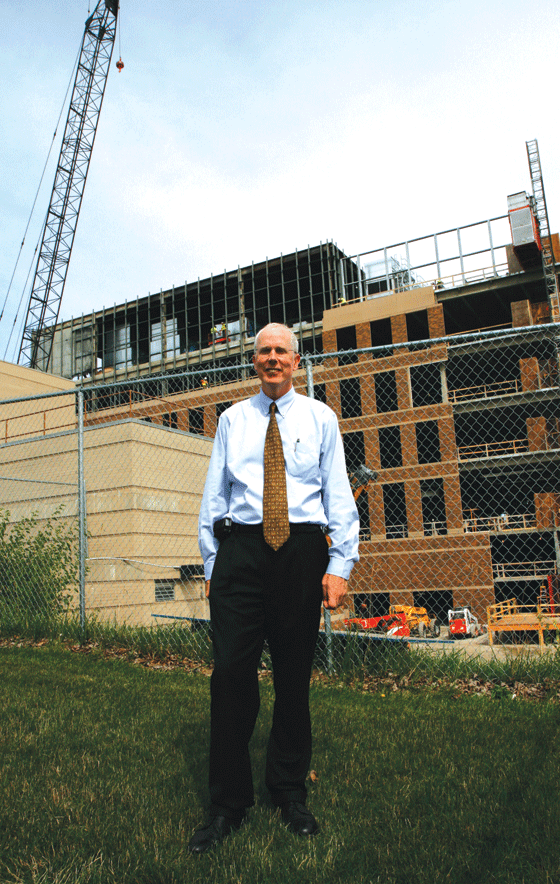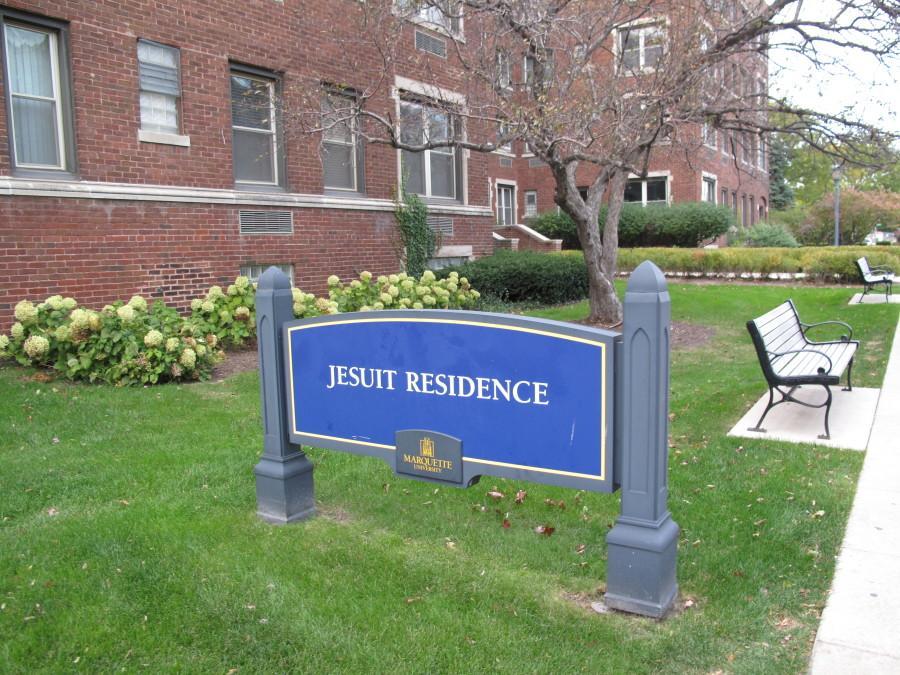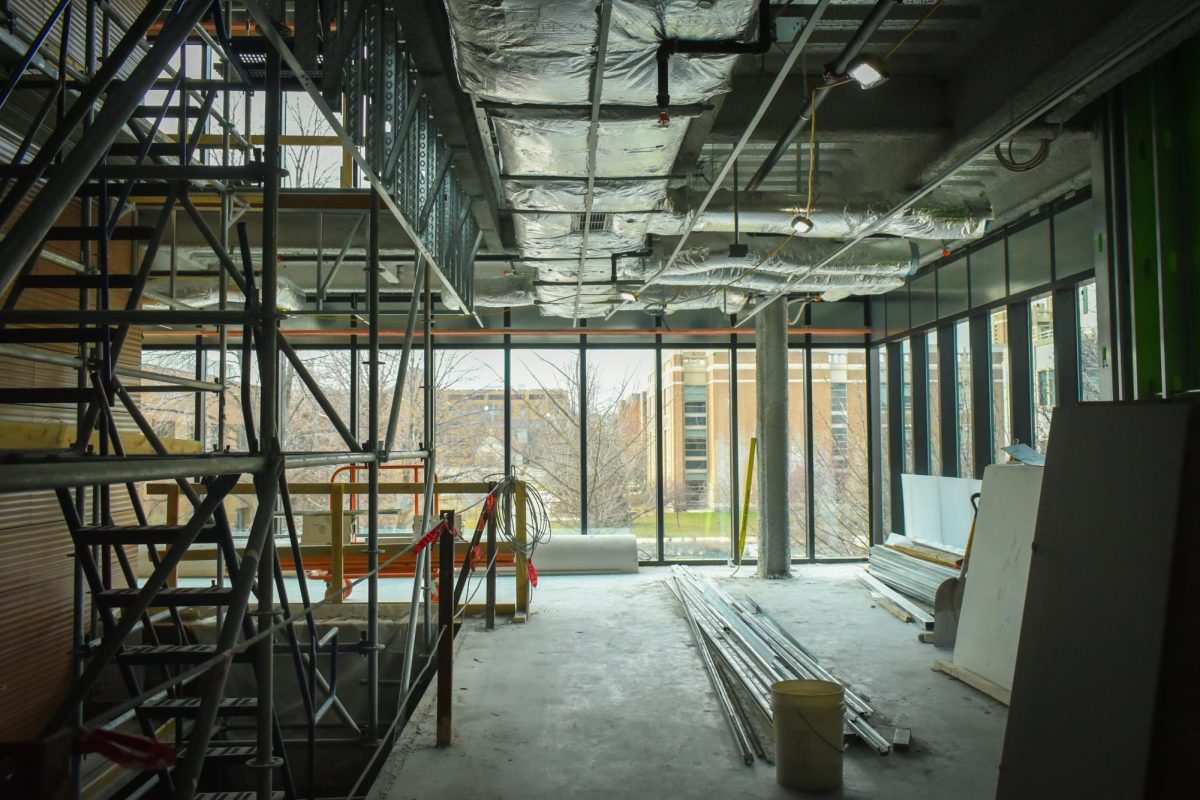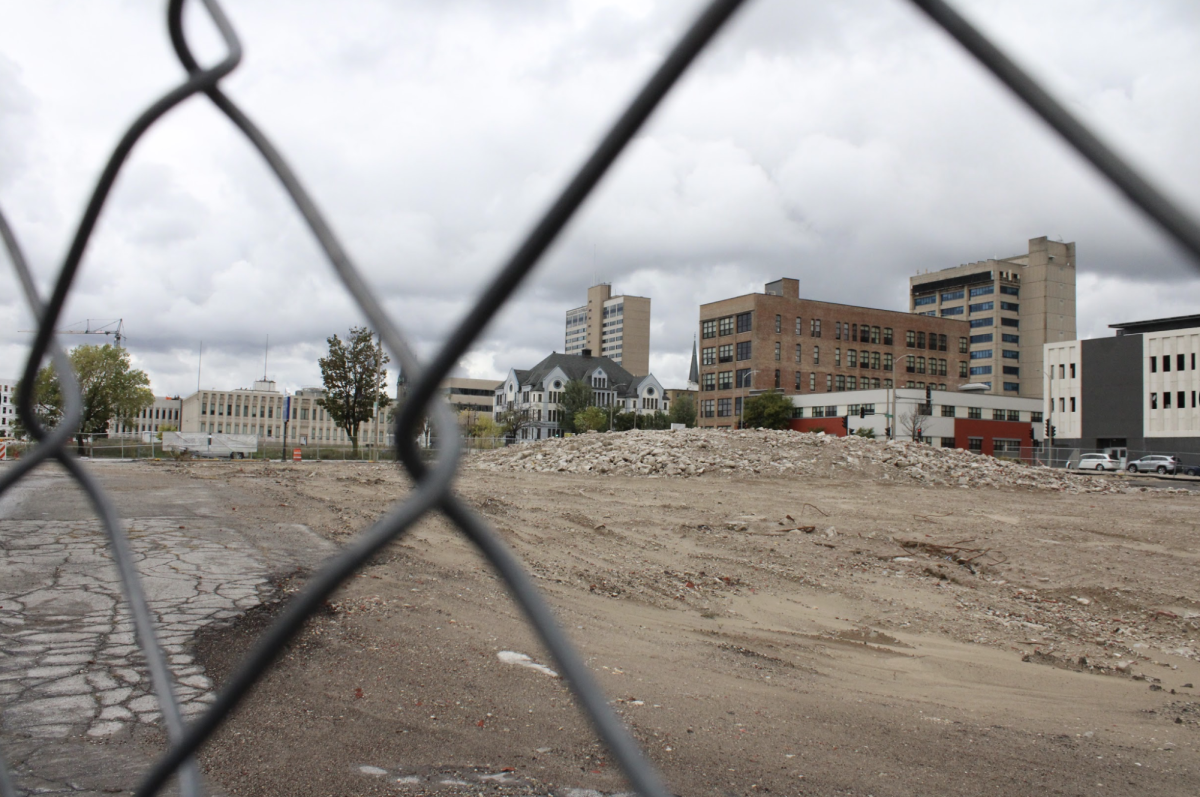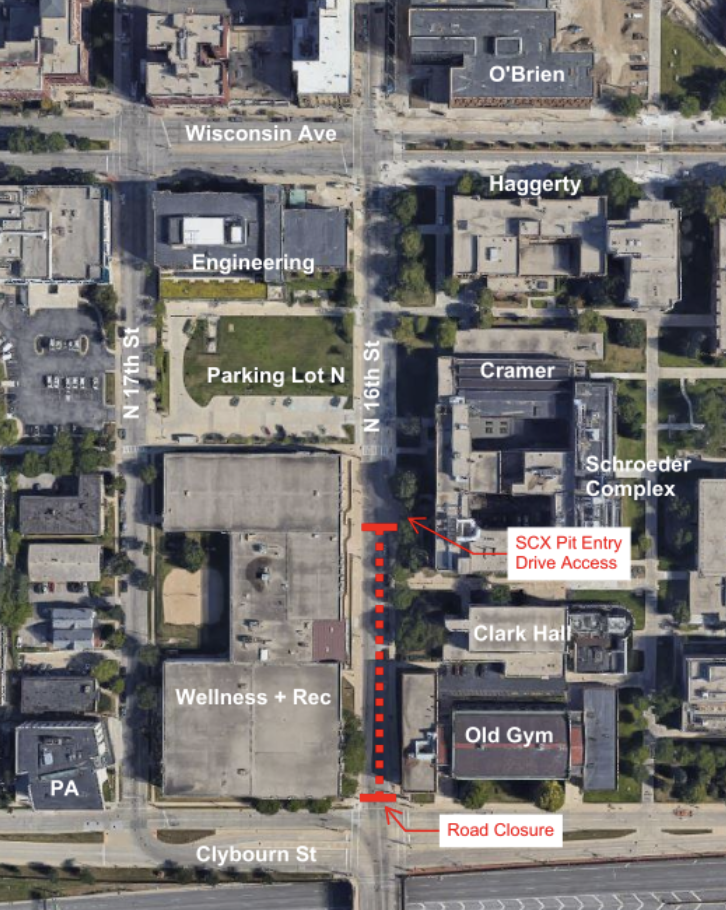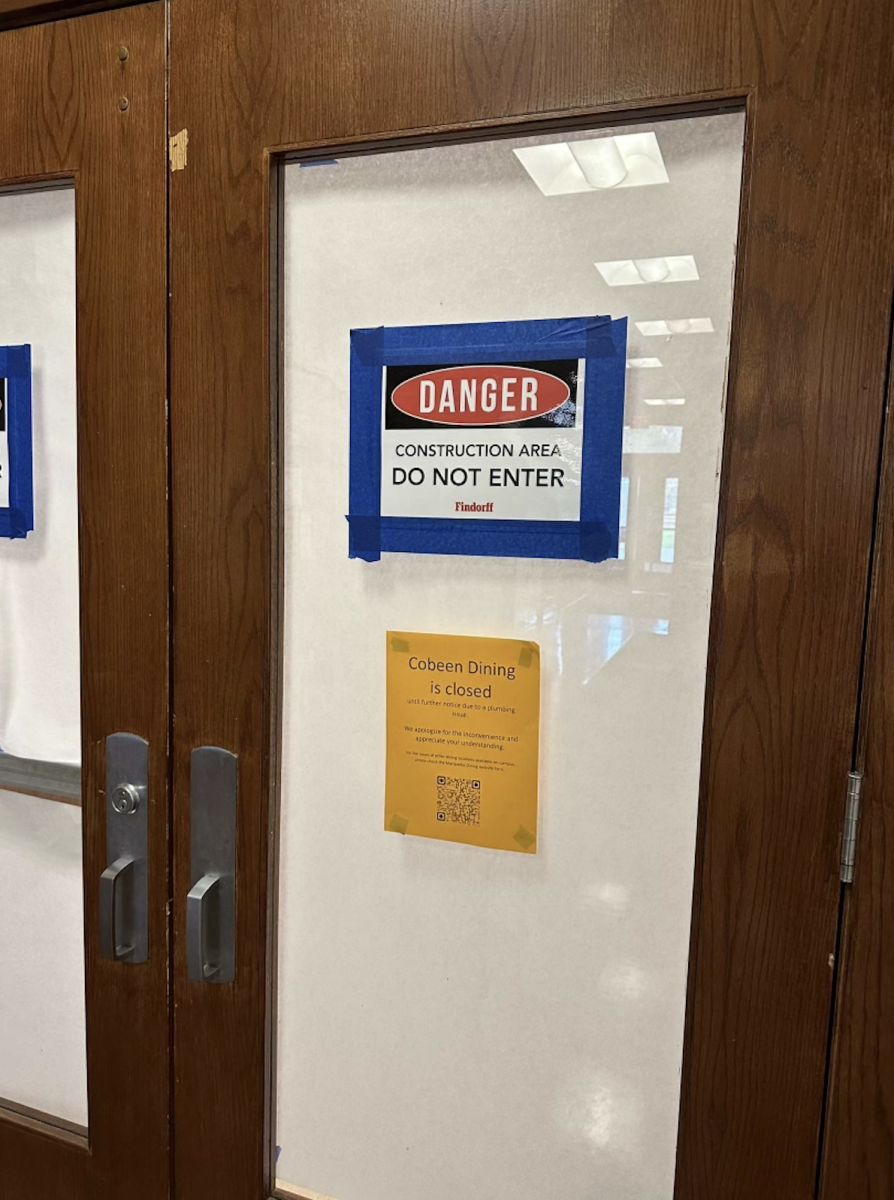
When walking around campus, it would seem at least one thing hasn’t been slowed down by the economy —construction.
All told, there is $130 million in construction and renovations currently under way. The university is nearing completion of two major projects—the new student services building, Zilber Hall, and the new law school building, Eckstein Hall. This summer also saw major renovations to McCabe Hall—the sophomore residence hall that opened this fall— and renovations on a smaller scale to Carpenter Tower. Other campus buildings such as the Varsity Theatre, Wehr Chemistry, Straz Hall and Johnston Hall received improvements.
The university is also in the nascent stages of construction on phase one of a new engineering facility, the Discovery Learning Center.
Though there have been other periods marked by significant construction, University Architect Tom Ganey said the  scale of current construction on campus is “unprecedented.”
scale of current construction on campus is “unprecedented.”
“It’s a very exciting time,” Ganey said. “I’m not sure that we’ve ever done this many things at the same time.”
The most recent similar period of construction was between 2002 and 2004, he said, when Raynor Library, the dental school and the Al Maguire Center were all built in a two-year span.
A master plan for Marquette
The source of such ambitious construction comes from the university’s master plan, which examines how the campus is laid out and identifies where new facilities would be desirable, said Art Scheuber, vice president of the office of administration.
The master plan, which is periodically updated, has been used for more than twenty years, Scheuber said. Recently, administrators began to pay more attention to the locations of buildings and the potential to create areas laid out with a specific intent, such as locating science and engineering buildings near each other.
Scheuber called these deliberately planned areas “districts.”
“In the last five years we’ve taken more of a view to look at adjacencies for what we are doing on campus,” he said.
The master plan also helps the university establish an identity by setting aesthetic standards for buildings so there is a consistent, coherent design for the campus, Scheuber said.
[youtube]PMyJjDh1a0k[/youtube]
He said the plan answers questions like how the university can define campus and how people know that they are on campus based on the surrounding buildings.
After the completion of the Al Macguire Center in 2003, university President the Rev. Robert Wild formed a committee tasked with updating the campus master plan, Ganey said.
“Throughout his presidency, he has been focused on the long-term vision,” Ganey said.
The update to the plan was solidified in the 2006 – ’07 school year, and Zilber Hall, Eckstein Hall, the Discovery Learning Center and McCabe Hall were all identified as priorities, he said.
In for ‘the long haul’
Zilber Hall is designed to provide a more efficient and consolidated location for various student services, like the Registrar, the Bursar and the Office of Admissions.
Ganey said the building will ultimately benefit the university because of how it will improve campus operations.
“You’ve got to think for the long haul,” he said.
The new law school is being built in response to a growing student population and the continued additions of new faculty members and programs.
“The university is a dynamic and growing place,” Ganey said. “We have to be constantly improving our place and facilities to meet the needs of a growing school population.”
The Discovery Learning Center, when fully completed, is intended to allow engineering students the chance for extensive interactive experiences.
“The building is set up for a whole new paradigm in education where students are involved in hands-on, lab-based education for all four years,” Ganey said.
Economics of construction
While spending so much money on new buildings when the economy is still so weak may seem illogical, the economy has not had as significant effect as might be expected on Zilber and Eckstein halls because financial planning and fundraising for them were done in stronger economic times, Ganey said.
The $85 million law school was paid for with donations, and the university took on debt in order to finance Zilber Hall and McCabe Hall, he said.
When the university takes on projects like these, student tuition money is never used, Scheuber said.
Tim Piatek, a senior in the College of Business, said he thought the construction was great for the university.
“I think that it’s amazing we’re in the depths of recession and Marquette is building three new buildings,” Piatek said.
But Colin Ehlenbach, a sophomore in the College of Health Sciences, isn’t certain a new law school is a sound use of money in the current economy.
“I feel like it might be a little unnecessary right now,” Ehlenbach said. “From what I’ve heard from others the old law building was just fine.”
The Discovering Learning Center will also be paid for with donations, but fundraising efforts have stalled in the wake of the economic downturn.
The university attempted to secure $10 million from the state to help fund the complex, but the Wisconsin Building Commission rejected the proposal in April.
Because of fundraising difficulties, a phased approach to construction will be presented to the university’s board of trustees in September, said Michael Switzenbaum, executive associate dean of the College of Engineering.
Currently, about $62 million in actual and pledged donations has been raised, with $24 million already received in cash, Ganey said. The total complex is anticipated to cost about $100 million.
Under the new proposal, the phase one building would contain the Discovery Learning Studios, which would include materials research and testing labs and a double-sized lab with an overhead crane, Ganey said. There would also be additional lab space, offices and student commons areas.
Despite the funding difficulties and the decision to stagger construction, Switzenbaum said no elements of the original design have been abandoned.
The Discovery Learning Center is part of the College of Engineering’s efforts to keep its program at the forefront of education by providing unique, hands-on experiences, he added.
“The building itself is part of the transformation of the entire college,” Switzenbaum said.
If the board of trustees approves the proposal, construction would commence in the spring and the first phase could be completed sometime by 2012, Switzenbaum said.
Zilber Hall is expected to be open in January 2010 and Eckstein Hall in August 2010, Ganey said.
Revamping residence halls
Work on residence halls, though not as noticeable as campus construction, also will affect Marquette students.
McCabe Hall opened to sophomore students last week, and Rick Arcuri, associate dean for administration for Residence Life, said student reactions have been very positive.
“It was worth all the time and energy we put into it just to hear that,” Arcuri said.
Portions of Carpenter Tower also received significant renovations. The third through eighth floors received improvements such as new sprinkler systems, lounges and additional outlets in rooms, he said.
The rest of Carpenter Tower will be renovated next summer, and the Office of Residence Life will also begin similar work in Cobeen Hall at the same time, Arcuri said.
The intent is to bring the other residence halls to an updated standard similar to McCabe Hall, he said.
No planned projects were abandoned because of economic troubles, but Arcuri said he wished they could have had the money to do work in Schroeder Hall similar to what was done in Carpenter Tower.
There is a chance projects currently planned for next summer might not be possible because of financial reasons, but right now that’s too far off to be determined, Arcuri said.

